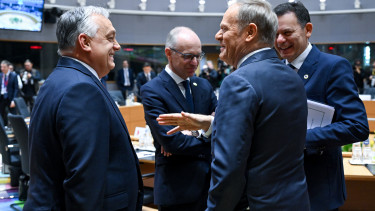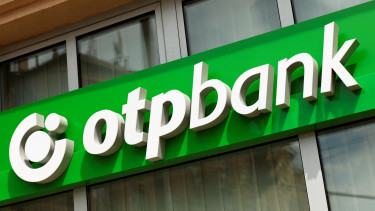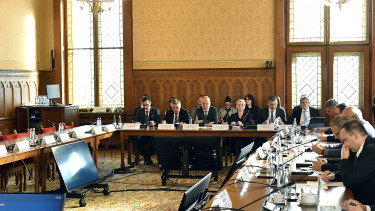Wartime repercussion: deposits held in Ukrainian banks up 55%

"We didn't get much sleep last night," say the Ukrainian Deposit Guarantee Fund (DGF) staff, apologising for the difficult meeting in front of the camera.
Impeccably dressed, smiling ladies - but it's hard not to notice the deep hollows under their eyes. As it turns out, the night before our first conversation was the 659th Kyiv air raid since last February.
"Russian aggression has been going on for a year and a half. Despite this, the banking system is stable and we are doing our best to keep it that way and maintain the confidence of the population," says Svitlana Rekrut, Managing Director of the organisation, and then, after a moment's pause, adds that it is not the professional work that is the hardest.

Deposit protection in times of war
The Russian attack of 24 February 2022 also disrupted the Ukrainian financial system. In one of the first steps taken by the country, which declared martial law, the National Bank of Ukraine (NBU) revoked the operating licenses of two banks (Prominvestbank and IR Bank) linked to the aggressor state, transferring their assets of 17 billion hryvnias (equivalent to HUF 156.4 billion) to the state budget, while the DGF started to compensate some 147,000 retail depositors protected by law. The total liability of the DGF as a result of the closure of the two banks amounts to UAH 1.2 billion (HUF 11.4 billion).
As a reminder, at the same time, as one of the effects of the war, 62,000 depositors of the Russian-rooted Sberbank, registered in Hungary, were compensated by the National Deposit Insurance Fund of Hungary (OBA).

The professional challenges faced by the deposit insurer did not end there; during the year, the financial supervisor withdrew the operating licences of four more banks. Megabank was already experiencing liquidity problems before the invasion, Bank Sich was insolvent by August, Bank Forward failed to meet its capital adequacy ratios and IBOX Bank was closed due to a flagrant breach of anti-money laundering and counter-terrorist financing rules.
Between 2022 and March 2023, the DGF paid out UAH 7.6 billion (HUF 69.9 billion) to depositors in connection with compensation for bank closures. A significant part of the work required for the payments was carried out in the basement.
"We now have everything we need downstairs; chairs, a table, internet and drinking water," they say of the facility's room, which has now been converted into an air-raid shelter. According to a website that collects air raid statistics, Kyiv residents have spent nearly 800 hours in shelters since the outbreak of the war. The DGF shelter can accommodate 160 people at a time.
Office on the front line
"The rights of depositors are paramount, even in times of war", the MD underlines the most important mission of the Deposit Guarantee Fund. The devastating impact of the Russian attack on the Ukrainian economy has made the protection of depositors' rights a priority for the stability and sustainability of the financial system.
Of course, all this is much easier said than done. Especially when the country is under attack by foreign forces and the institution has to be moved out of the capital. Many of the fund's 300 employees lived in the north-west of Kyiv, in the later infamous Bucha and Ipriny neighbourhoods, and in the vicinity of the Hostomel airport, just 33 kilometres from the Kyiv Parliament. As Russian troops moved in, dozens of DGF staff were trapped in their homes - cut off by the front line. At the same time, to keep the organisation running, 50 of the DGF's management and key staff (mostly with their families) moved to a quieter (unnamed) part of the country (for security reasons) to continue their work. Then, in the summer of 2022, they moved back to the capital, shouldering daily air raids and missiles.
The institution's rapid response was helped by the fact that two weeks before the Russian attack, it had drawn up an action plan for business continuity in claims work and staff security, although, as one of them notes, they themselves did not believe that this plan would ever have to be taken seriously.
Safety of the bank
Following the withdrawal of Russian forces from Kyiv in April, a significant change in the protection of Ukrainian bank depositors took place. The compensation limit of UAH 200,000 (1.8 million HUF) deposited in banks was raised to 100% by Parliament. The blanket guarantee, which covers both capital and interest earned, is a tool that a state can use in times of crisis (see: a similar measure announced in Hungary at the end of 2008 and withdrawn a few months later). The unlimited Ukrainian deposit protection lasts for 3 months during and after the end of the state of war, after which it is tripled to UAH 600,000 (HUF 5.4 million).
Thanks to strict prudential supervision, a fast and accessible compensation system, functioning ATMs and open branches, as well as responsive public institutions, the Ukrainian public's confidence in the banking system has been maintained.
To the extent that the number of bank deposits increased by 31% to UAH 65.4 million by 1 January 2023, the banking system's deposit stock, without major outflows, grew by 55.6% from UAH 675.6 billion (HUF 6 215 billion) in the previous year to UAH 1,051.5 billion (HUF 9 673 billion).


There were several factors behind this significant growth. In July, the National Bank of Ukraine relaxed foreign exchange restrictions and allowed individuals to buy foreign currency on condition that it was used for fixed-term deposits, which led to the first increase in the volume of foreign currency deposits since the COVID-19 crisis.
However, according to their report, the impact of transfers to the accounts of social benefit recipients and the military - the latter mostly concentrated in state-owned banks - was greater. In addition, in April 2022, the Oschadbank (State Savings Bank) became a member of the DGF, which increased liabilities by an additional UAH 129.7 billion, and finally, the appreciation of foreign currency deposits contributed to the increase.
Weapons of deposit insurance
In addition to the ability to react quickly, one of the most important assets of all deposit insurers is their existing asset base. The DGF's assets available for compensation at the beginning of 2023 amounted to UAH 90.9 billion (HUF 837 billion). Given the external circumstances and the perceived high future risks in the banking system, the management of the organisation decided to "keep its powder dry" and achieve a coverage ratio of 2.5% within one year. This is the figure that shows the size of the organisation's assets in relation to the total indemnity liability (the insured deposits of all member institutions).
The coverage rate of 2.5% is considered high by international standards. The US Federal Deposit Insurance Corporation (FDIC) currently has a target of between 2-2.5%, while the Hungarian National Deposit Insurance Fund (OBA) had a coverage of 1.15% at the beginning of 2023 (before the repayment of the bond issued in connection with the Sberbank indemnity).
The Ukrainian Deposit Guarantee Fund's position was helped by the fact that it is a member of the Ukrainian Financial Stability Board, which meant that it was informed of the authorities' intentions without delay. The professional work carried out by the DGF has also attracted international attention.
"No other deposit insurance institution has ever had to serve the country's financial stability under the same conditions as its Ukrainian counterparts. One of the important tasks of the European Forum of Deposit Insurers (EFDI) is to facilitate knowledge transfer between national deposit guarantee schemes, as any knowledge shared will strengthen financial stability in Europe. In this respect, our annual conference in Budapest in May this year was of particular importance, where our Ukrainian colleagues presented the work they have done and the way they have coped despite the extreme circumstances," said Stefan Tacke, President of the EFDI.

Preparation for a resilient banking system
The measures taken before the outbreak of the war have contributed to the sector's resilience, as Oleksandr Zyma, chairman of the Ukrainian Deposit Insurance Corporation, describes in his annual report:
"The fact that banks received the Russian attack in a reformed and recapitalised state has helped the banking system not only to survive, but also to become a model of stability. The decisions taken during the years of the Covid-19 pandemic strengthened the system and made it adaptable. This, together with timely action by regulators and the state, minimised the negative impact of the state of war. The balance of depositors' funds reached UAH 1,000 billion (HUF 9,200 billion) at the end of 2022.
In order to maintain banking operations, regulatory burdens have been eased, reporting to the authorities has been simplified, the deposit insurance premium fee has been optimised and on-site inspections of banks have been suspended on a temporary basis. Citizens and businesses with outstanding debts to closed banks have been granted a payment holiday and allowed to restructure their loan repayments.
Remote payment has become one of the most convenient and flexible tools for successful deposit insurance compensation. The regulator has lifted the obligation to be physically present to open a bank account. This was also important because, according to official UN figures, 8 million Ukrainians have left the country and another 6 million have moved to a new location within the country, and the DGF also insures their bank deposits.
When communication takes on strategic importance
After 24 February 2022, the most important task for Ukraine's financial stability institutions was to prevent panic. This was done through intensive communication with banks and their customers.
"More than 60,000 phone calls were made from all over the country, including the occupied territories, asking about the safety of their bank deposits. Many of these calls were not only for information on bank accounts, but also for mental support for desperate and frightened customers, as we sometimes also needed psychological help. Many times we had to talk to frightened customers worried about their life's work, not to mention the experience of aggression by foreign armed men against crowds of civilians. This was one of the most challenging parts of the job," reveals Iryna Servetnyk, DGF’s Head of PR.
"As an indication of the interest and the scale of the task, our social media content has reached 10 million views and 220 press releases were issued during the year. Coverage was not helped by the impact of the war, which saw many former economic journalists become war correspondents and the weight of financial news overshadowed by coverage of casualties, new weapons and frontline events," she adds.
With the intention of sticking to normality, the DGF also continued its activities in peace, holding 40 financial education events in cooperation with NGOs, as well as financial education trainings attended by 2500 teachers from cities familiar from the fighting, such as Kherson, Dnipro, Mykolaiv and Luhansk.
An indispensable part of the body
"Basically we've been lucky so far, but we have colleagues who have lost their fathers, some who have lost their brothers and unfortunately one of our colleagues lost both parents at the same time during the bombardment of Mariupol," they say quietly.
Since the declaration of martial law, Ukraine has no public holidays, no Easter, and no Independence Day. Except for Transcarpathia, there is a curfew everywhere - currently between midnight and 5 a.m. in the capital - and no traffic during air raids. During the winter, Russian attacks on the country's infrastructure have meant that children have been taken to work instead of school. Thanks to the gasoline generators that kept the institution running, the office had electricity and thus became a public education institution for this emergency period, in addition to providing deposit insurance.
"We are very tired. The hardest thing is that we are on an emotional roller coaster. One day we hope it will be over tomorrow, then the next day a drone hits the next street. And we know the victims, we know their names, we can still see their faces. We went grocery shopping with them, we took the kids to school together. We have been living in a situation of constant stress for a year and a half." - they say, heads down, eyes averted from the camera.
This year would be an extraordinary year, as the DGF celebrates its 25th anniversary. Due to the state of war, the organisation is unable to hold a professional conference in Kyiv, with international speakers invited. Instead, they have volunteered to prepare packages for the Ukrainian army, as they did last year, including water purifiers, medical supplies, hand warmers, lamps, sleeping bags and children's drawings for those on the front line.
Volunteering and showing solidarity to an estimated 17 million people in need of humanitarian aid has become a core value of the organisation, and helping others has become an important tool for personal survival in terms of mental health. To find out how they do it, they point to and draw strength from the resilience of their heroes, both well-known and anonymous. They mention that they have heard of the Hungarian organisation called the Transcarpathian Dragon Suppliers, which is raising funds for the survival of Shandor Fedir's team. They are all touched by the Hungarian-born tourism lecturer from the University of Uzhhorod. For them, he is clearly a national hero ("He is one of our superheroes").
There is no time to say goodbye, they have to go. One sentence still rings out: "Thank you Europe for not abandoning us."
(The author served as the Communications and International Relations Officer of the Hungarian National Deposit Insurance Fund (OBA) from 2010-2019.)
Cover photo: Panama7 via Getty Images










